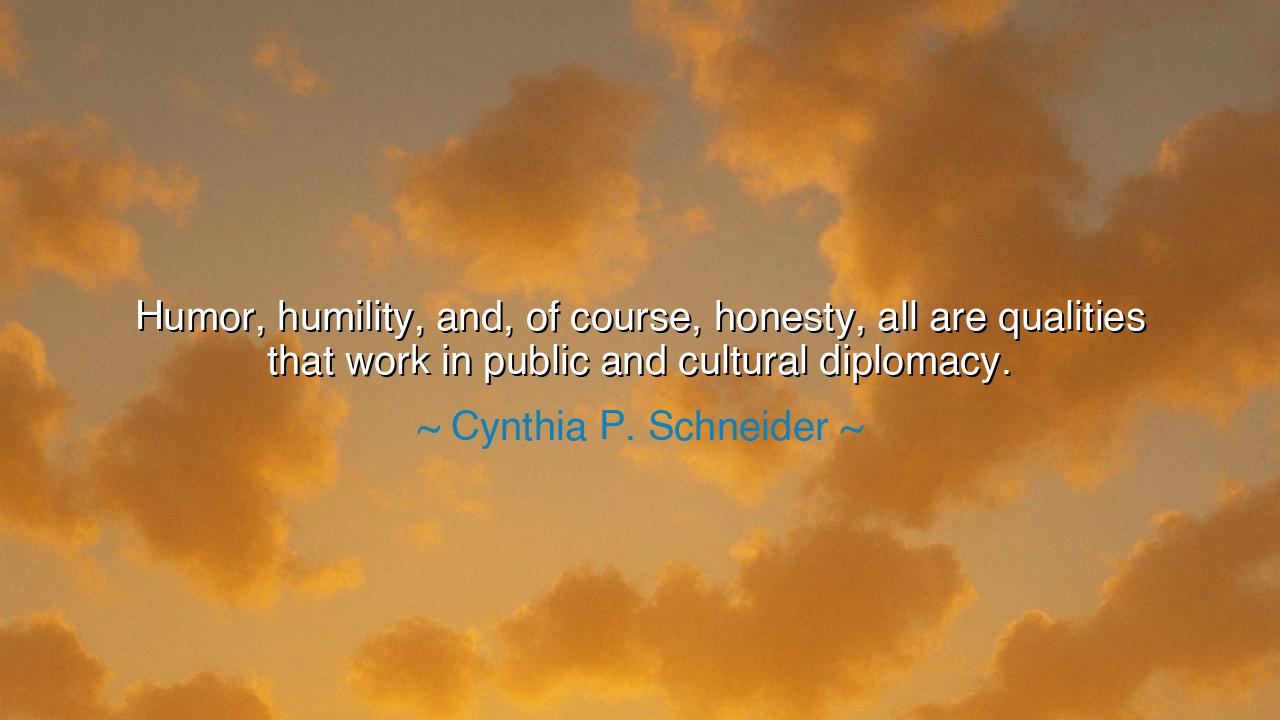
Humor, humility, and, of course, honesty, all are qualities that
Humor, humility, and, of course, honesty, all are qualities that work in public and cultural diplomacy.






In the words of Cynthia P. Schneider, a diplomat and scholar of culture, there resounds a truth that bridges nations and hearts alike: “Humor, humility, and, of course, honesty, all are qualities that work in public and cultural diplomacy.” Though born in the world of politics, these words belong to the realm of eternal wisdom, for they speak not only of the art of diplomacy but of the art of human connection itself. Whether between nations or neighbors, peace is not forged by pride or power, but by these three quiet virtues — humor, humility, and honesty — the golden triad of understanding.
Humor is the first bridge between strangers, the spark that melts suspicion and softens fear. It is the universal language of the heart, understood by all who have suffered and triumphed. The diplomat who laughs with his counterpart does more than share amusement — he declares, “We are alike.” For laughter is born of recognition, of shared humanity. It disarms hostility without surrender and transforms debate into dialogue. The ancients knew this well: even in the councils of kings, the jester often held more power to heal a quarrel than a dozen armored guards. In the laughter of men, truth slips in like sunlight through clouds.
Yet humor alone is not enough; it must be joined with humility, the second pillar of Schneider’s wisdom. To be humble is not to bow in weakness, but to stand in truth — to know one’s place within the vastness of creation and to speak not from ego, but from understanding. The proud cannot negotiate peace, for pride blinds them to the dignity of others. But the humble see the world through the eyes of their neighbor and therefore speak the language of reconciliation. Humility is the quiet force that turns confrontation into cooperation and transforms conflict into respect.
One need only recall the story of Mahatma Gandhi, who in his modest dress and gentle manner moved empires more firmly than any army could. When meeting adversaries, he did not thunder or threaten; he smiled. His humor was light but piercing — often he turned an insult into a lesson, a jest into wisdom. His humility drew even his enemies to listen, for they sensed no arrogance in him, only sincerity. And his honesty, the third virtue in Schneider’s trinity, made him incorruptible. These three together — the wit to connect, the humility to listen, and the honesty to speak truth — became the instruments by which he reshaped the moral diplomacy of the world.
For honesty is the soul of all true communication. Without it, laughter becomes manipulation, and humility becomes deceit. The diplomat, like the philosopher, must be guided by truth, even when truth is uncomfortable. In the ancient courts of China, the greatest advisors were those who dared to speak honestly to the emperor, even at risk of their lives. Such men were revered not for their cunning but for their integrity, for a ruler who silences truth invites ruin. Honesty is not the loud virtue, but the enduring one — it is the compass that keeps all other qualities aligned with righteousness.
Thus, Schneider’s words rise beyond politics and speak to the conduct of every soul. For in truth, we are all diplomats — ambassadors of our families, our beliefs, our nations, and our hearts. Every conversation, every meeting, is a small act of diplomacy. When we speak with humor, we build connection. When we live with humility, we earn respect. When we act with honesty, we create trust. These three together are not merely tools of influence; they are the marks of a noble spirit, the signs of civilization itself.
Let this, then, be the teaching passed down: if you wish to move others, first learn to move yourself. Approach life with humor, that you may remain light even under burden. Cultivate humility, that you may see the worth of others. Hold fast to honesty, that your words may carry the power of truth. These are not the weapons of war, but the instruments of peace — subtle, steadfast, and strong.
So, walk forth as the ancients would have you do — with laughter upon your lips, reverence in your heart, and truth as your guide. For the one who masters humor, humility, and honesty does not merely negotiate peace between nations; he becomes peace itself — a living harmony, whose presence teaches without command and whose soul speaks the universal language of understanding.






AAdministratorAdministrator
Welcome, honored guests. Please leave a comment, we will respond soon